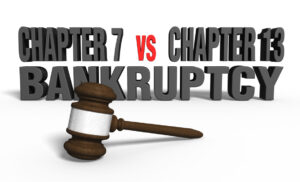Difference Between Debt Relief Options, Chapter 7 and Chapter 13
As a bankruptcy attorney, I am asked a lot of questions regarding the different  types of bankruptcy filings. Most of my clients have never filed for bankruptcy before and are uncertain of how the process works and whether or not it is right for them. I recommend scheduling a consultation so that we can discuss your financial situation and the options that are available to you. In the meantime, here are the basics of what you should know:
types of bankruptcy filings. Most of my clients have never filed for bankruptcy before and are uncertain of how the process works and whether or not it is right for them. I recommend scheduling a consultation so that we can discuss your financial situation and the options that are available to you. In the meantime, here are the basics of what you should know:
Negotiating Debt
Prior to filing for bankruptcy, I can help you to negotiate with creditors. In some cases, they will accept a payment plan or a lower payoff amount without you needing to go to court. This works best when you have some cash personally, or you can borrow some from family members. Typically, if a creditor agrees to accept a lower payoff amount they expect the payment to be made shortly after that.
Chapter 13
If you do not have money to direct towards paying off your debt or if your creditors are unwilling to work with you, filing a Chapter 13 bankruptcy can be an excellent solution. As a bankruptcy attorney, I recommend this option for anyone that wants to pay back a portion of their debt but is simply unable to do so with the current repayment terms. In this solution, I would work with you to create your budget, seeing how much money you earn on a monthly basis and how much is going out for your living expenses. This must include essentials like food, gas, insurance, rent and utilities. The money that is left over can be allocated towards debt repayment. A plan needs to be drafted and presented to the court. If certified, you will start making one payment per month, and that money will be allocated amongst your creditors. Each one will get a partial payoff, and any debt that is remaining will be written off. Typically this plan lasts for several years so it must be a plan that you can live with.
Chapter 7
As a bankruptcy attorney, I can take you through the process of filing for a Chapter 7 bankruptcy instead. This solution is commonly referred to as a liquidation bankruptcy where your debt is written off without the need for you to make payments. If you are in a situation where you simply do not have the income to make payments, this will be the best option for you. Keep in mind, however, that if you stop paying on secured debt (like your car loan) the collateral can be repossessed regardless of the bankruptcy.
For more information or to find out which solution is best for you, call my office and schedule a consultation. The decision of whether or not to file for bankruptcy and which type of bankruptcy to select is extremely personal. It must be right for you and your family and I can help you to select the solution that works the best for your current and future financial needs.